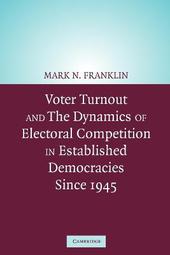
|
Voter Turnout and the Dynamics of Electoral Competition in Established Democracies since 1945
Paperback / softback
Main Details
| Title |
Voter Turnout and the Dynamics of Electoral Competition in Established Democracies since 1945
|
| Authors and Contributors |
By (author) Mark N. Franklin
|
|
With Cees van der Eijk
|
|
With Diana Evans
|
|
With Michael Fotos
|
|
With Wolfgang Hirczy de Mino
|
| Physical Properties |
| Format:Paperback / softback | | Pages:294 | | Dimensions(mm): Height 228,Width 150 |
|
| Category/Genre | Political economy |
|---|
| ISBN/Barcode |
9780521541473
|
| Classifications | Dewey:324.6 |
|---|
| Audience | | Professional & Vocational | | Tertiary Education (US: College) | |
|---|
| Illustrations |
24 Tables, unspecified; 12 Line drawings, unspecified
|
|
Publishing Details |
| Publisher |
Cambridge University Press
|
| Imprint |
Cambridge University Press
|
| Publication Date |
19 April 2004 |
| Publication Country |
United Kingdom
|
Description
Voting is a habit. People learn the habit of voting, or not, based on experience in their first few elections. Elections that do not stimulate high turnout among young adults leave a 'footprint' of low turnout in the age structure of the electorate as many individuals who were new at those elections fail to vote at subsequent elections. Elections that stimulate high turnout leave a high turnout footprint. So a country's turnout history provides a baseline for current turnout that is largely set, except for young adults. This baseline shifts as older generations leave the electorate and as changes in political and institutional circumstances affect the turnout of new generations. Among the changes that have affected turnout in recent years, the lowering of the voting age in most established democracies has been particularly important in creating a low turnout footprint that has grown with each election.
Reviews"This remarkable book repays attention from scholars and policymakers alike. It builds on two or more generations of careful scholarship, but literally takes that work to another level--in this case, another level of analysis." - Richard Johnston, University of Pennsylvania
|